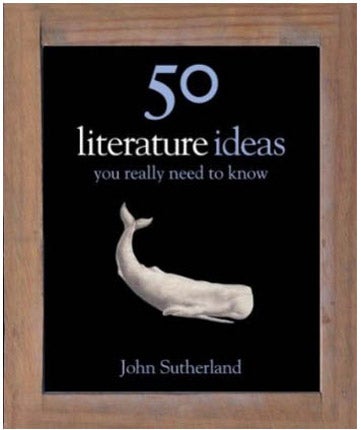50 Literature Ideas You Really Need to Know, By John Sutherland<br/>Faulks on Fiction: Great British Characters and the Secret Life of the Novel, By Sebastian Faulks
Know your Hermeneutics from your Deconstruction? Fear not, two leading critics break down the theories and provide fresh insights into classic texts

For many readers of John Sutherland's 50 Literature Ideas You Really Need to Know, I suspect that the title could more accurately read: 50 Literature Ideas That You Have Forgotten Since Finishing Your English Degree.
It will undoubtedly be read by Eng-Lit geeks, but it should be enjoyed by any engaged reader of fiction.
Sutherland describes this round-up of ideas from Allegory to Textuality (via Hermeneutics, Plagiarism, Translation et al) as a "toolkit" for readers. Each idea is squeezed into only four pages, including a timeline, quotes and a "condensed idea". I'd call it an epic task, if I hadn't just read the succinct explanation of Epics, from Gilgamish to Star Wars. A couple of cases, such as Deconstruction, prove to be uncondensable – but anyone who ever battled with J Hillis Miller's "The Critic as Host" will probably forgive a little haziness in that chapter. As an introduction to how to read, and why we read, it is a remarkable success. "Literature is ultimately there to give pleasure," Sutherland writes. "Read intelligently, it is one of the very highest pleasures life has to offer."
As a former student of linguistics and literary theory, I admit that I'm favourably inclined towards anyone who makes jokes about "linguists' jokes". And, in the run-up to Valentine's Day, with its inevitable "most romantic reading" lists, I am grateful to anyone who shares my (apparently unfashionable) view about Marvell's "To His Coy Mistress" (or "To the Virtuous Woman I Desperately Want to Screw but Don't Want to Marry", as Sutherland retitles it). On the other hand, his "How Well Read Are You?" quizzes won't win many fans among people who think they are. Generally, though, it is intriguing to be gently questioned about what reading is and should be. To understand Hamlet better, would you: 1) Travel forward millennia, to when the last word of Shakespearian criticism has been written? 2) Travel back to the Globe Theatre, London, in 1601?
A well-read person in Chaucer's England had maybe six books on his shelf. Now, millions of books are available. Do we have more knowledge in 2011, or more of which to be ignorant?
Sutherland stands on the shoulders of giants to bring us this history and future of literary theory, and is not above quoting its heroes and villains (Sir Frank Kermode and Ronald Reagan in quick succession) to add grist to or gently mock his endeavour.
"Authors tend to dislike critics who ... presume to discover more about their (the writers') creation than they ever know themselves. Some authors positively detest these lice on the locks of their literature," he writes, backed by a scathing Nabokov quote.
It is a bold move by Sebastian Faulks, then, to act as a louse on the locks of some of our best-loved literature, but that's what he does in his book (to accompany the TV series), Faulks on Fiction. Faulks is fed up with modern journalists and critics caring more about the author's biography than about the work, and so he concentrates here on each character as if he or she is real. Unfortunately, he must then apologise for putting so much of himself into the book (he did a lot of blubbing as a 14-year-old reader, it seems) and blame the bigger boys at the BBC for making him do it. It's hard to see, then, why in a chapter supposedly about James Bond, we must learn all about how and why Faulks wrote his new Bond book. Or why he interviewed so many of the (living) authors whose work he writes about (it turns out in the acknowledgements).
The book works well as a history of the novel and its uneasy relationship with society. It is less successful when Faulks starts diagnosing characters: Tom Jones's Lady Bellaston is "a cougar"; Heathcliff fears abandonment; Darcy is depressed; Lovelace a sociopath; oh, and, re Lady Chatterley, "Repeated rhythmic penetration is what some women like best." Psychoanalytic literary theory is nothing new; but this theory – that most things in literature basically come down to bonking – just might be.
It is interesting to read this book in the light of Sutherland's lessons about who "owns" a narrative. It is a tribute to the skill of the writers whose work Faulks cites, I suppose, that he feels he "knows" their characters better than they or other readers do. But I'm still not sure that a lengthy and robust legal defence of Alec D'Urberville, concluding that "the balance of evidence at this point would not be enough to secure a rape conviction", is a useful form of literary criticism.
Faulks is caught in a paradox: he is writing for intelligent readers who know and love literature just as much as he does. They cannot help, then, but hate much of what he writes.
To order any of these books at a reduced price, including free UK p&p, call Independent Books Direct on 08700 798 897 or visit independentbooksdirect.co.uk
Join our commenting forum
Join thought-provoking conversations, follow other Independent readers and see their replies
Comments
Bookmark popover
Removed from bookmarks